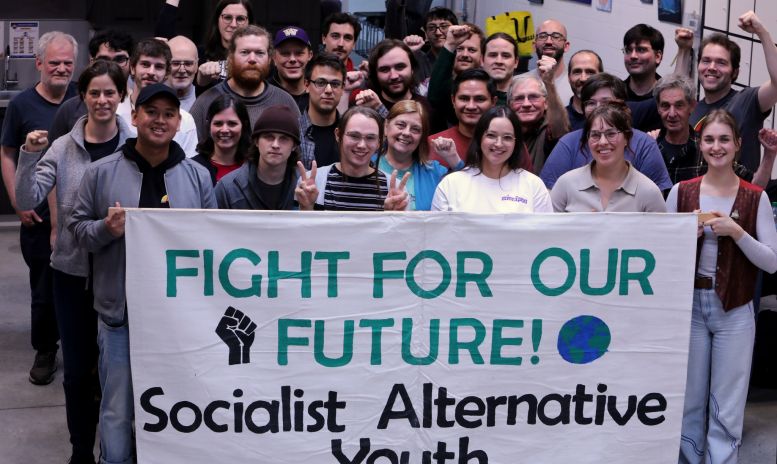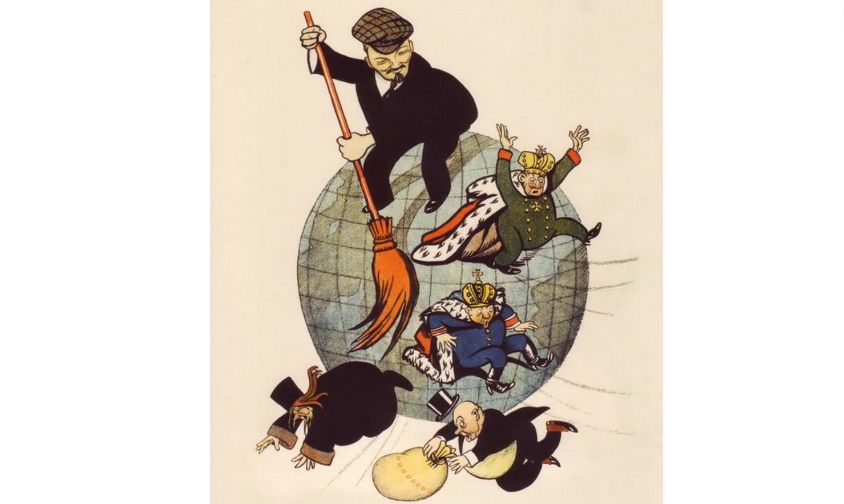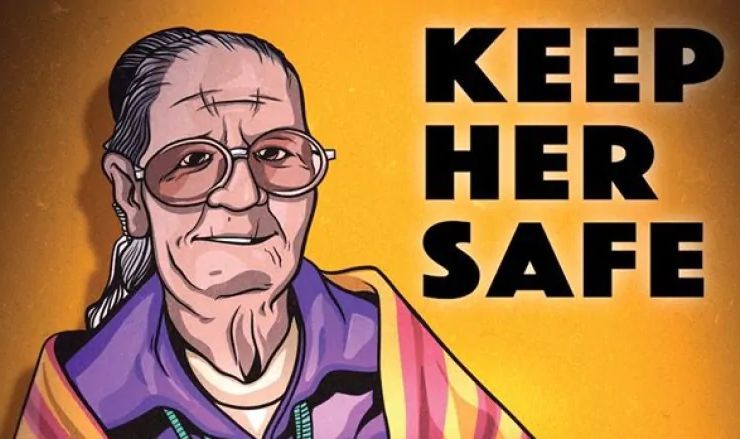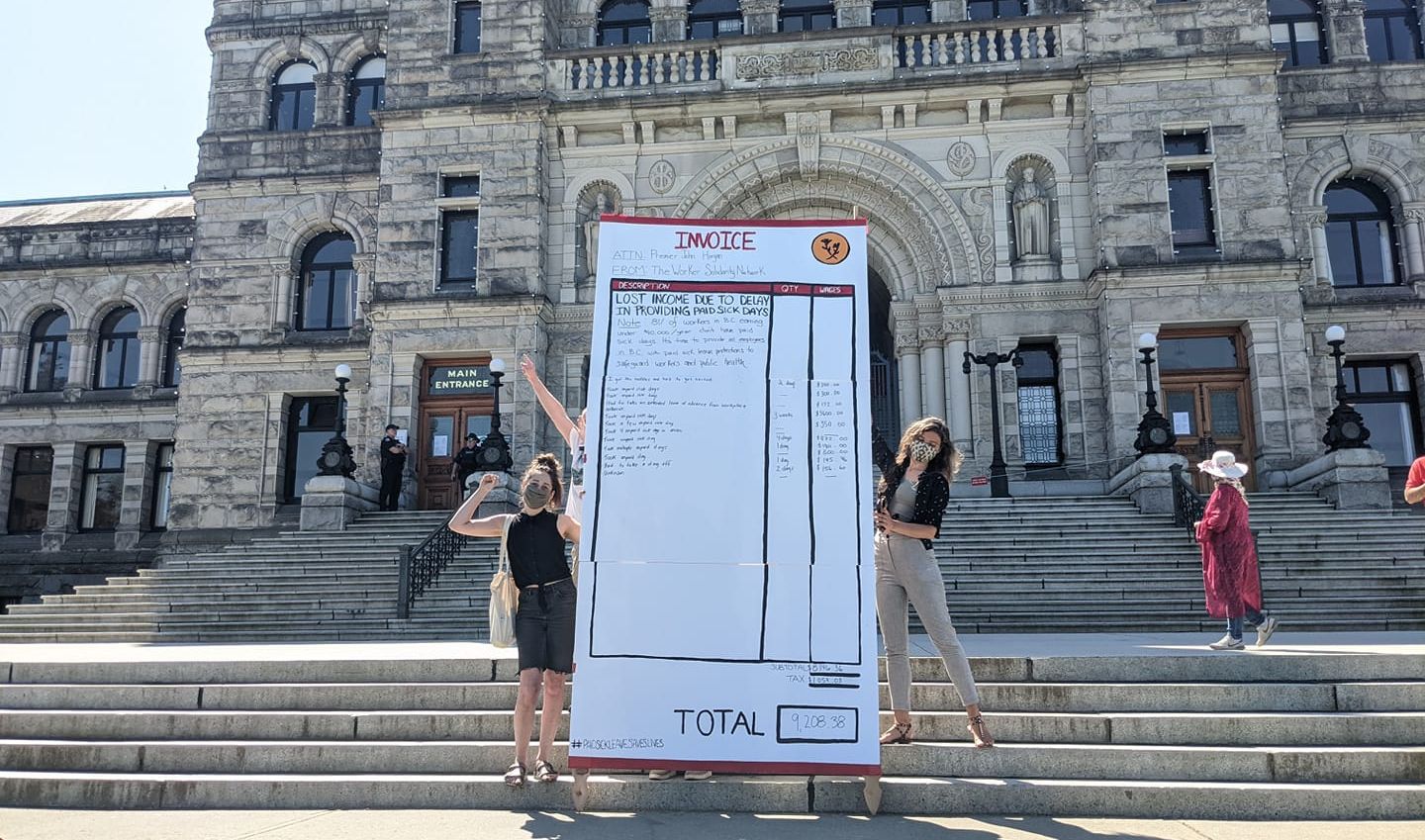Clarity and purpose in a world of turmoil
Socialist Alternative Canada (SA) recently held its 4th National Conference, which was a resounding success. Members from across the country attended as well as international visitors from four other sections of International Socialist Alternative (ISA): Québec, the United States, Mexico, and China/Hong Kong/Taiwan.
While the conference was taking place, the Vancouver police were “clearing” the encampments of the unhoused along East Hastings — metres away from luxury restaurants, the poorest of the poor were deprived of what little they still had; a new oil pipeline funded by the Canadian state was being built in the suburbs; Indigenous communities were denied sovereignty of their land; and the planet had reached the highest concentration of atmospheric carbon dioxide since the evolution of our species. Due to government policies, Canada was the highest cumulative, per capita, contributor to the destruction of planetary habitats, which drives the extinction of millions of species and threatens humanity’s future. People’s mental health in many countries was getting worse.
In the midst of the multiple nightmares of contemporary capitalism, the conference felt like an island of sanity and reason. In a calm, precise analysis of the present situation, based on first-hand experiences of working people worldwide, and the commitment to meaningful, bold interventions in their daily struggles, SA Canada and ISA provide a counterpoint to the madness of capitalist-optimism on the one hand, and resignation of “doomerism” on the other. The example of older, more experienced comrades showed us that age is no barrier to humbleness, enthusiasm, and generosity of spirit. The youngest comrades, inspired with the depth of their wisdom, showed maturity beyond their years. Unsurprisingly, multiple comrades have noted the mental health benefits of the struggle to overcome capitalism.
World Disorder
The first day of the conference was dedicated to a review of global trends and developments, introduced by Tom Crean on behalf of ISA’s International Executive. Multiple comrades from Canada and abroad contributed to the discussion.
The present era is defined by a conflict between the US and Chinese imperialist blocks. The conflict has been deepening with trade wars, an accelerating arms race and the brutal war in Ukraine that is part of this conflict. The capitalists worldwide are in conflict over markets, resources and political influence.
State spending and interventions in the economy and spending are seen as increasingly necessary to support economic growth. Due to the weakness of the working class’s leadership, these interventions are on behalf of private capital.
The political legitimacy of the ruling classes — the trust in political institutions — is deeply undermined by soaring inequality and declining public services. The world is more unstable than it has been for decades. The economy and workers’ living standards are ravaged by inflation and threatened by a looming recession.
Working-class people should take a strong stance of anti-imperialism and international solidarity.
Canada: Growing Polarization
On the second day, we discussed developments in Canada and building Socialist Alternative with insights from across the country. Visiting comrades drew parallels with struggles in other countries.
In the inter-imperialist conflict, Canada has further abandoned any pretense of an independent policy vis-a-vis China and has closely aligned itself with US imperialism.
The cost-of-living crisis is getting worse as inflation and the response of the Bank of Canada push up the cost of food, rent and mortgages. Despite the recent increase in jobs, a recession remains likely as high interest rates hit spending, construction and other sectors of the economy. In spite of years of low taxes on corporations, they have not invested in production or raising productivity, preferring to speculate on various asset bubbles. The claims of neoliberalism have been shown to be a lie.
Workers’ wages are not keeping up with inflation, so workers have to fight to defend their living standards. Some strikes in the private sector have won significant wage increases. Strikes in the public sector, especially in Ontario, have forced the government to retreat from their attacks on union rights’ but did not win a cost-of-living adjustment. The failure of union leaders to organize effective struggles is feeding a shift in the consciousness of rank-and-file workers. In ballots to ratify agreements, large minorities voted to reject the inadequate deals.
Canada’s health care system, once a source of pride, is in deep crisis after decades of neoliberal cuts, and some provinces, such as Alberta and Ontario, are privatizing parts of the health care sector. The possible future of privatized health care, if not defeated, is clear in the abject failure of health care in the US. A care crisis is looming, with thousands of vacant positions and lack of workers to fill them. Emergency services have been stretched beyond the breaking point in some areas.
All Canadian provinces face similar issues including unaffordable housing, the cost-of-living crisis, and food insecurity. To protect women’s rights, we need to fight for housing, the rights of essential workers and against systemic violence. Although the federal government has promised $10/day child care, there is a large shortage of places and it is in crisis because of low pay and lack of workers.
The Canadian government makes nice noises about the environment but plans to increase the production of fossil fuels and provides billions in subsidies including building a very expensive pipeline to the Pacific Ocean. The hypocrisy on climate is only exceeded by the hypocrisy on Indigenous rights.
The Canadian capitalist state is based on colonialism. Indigenous resistance to the state’s attempts to weaken and destroy them and their cultures has never ceased. Importantly, there has never been more support from non-Indigenous peoples. However, Canadian capitalism, and its political parties, is based on the theft of land, turning common stewardship into private exploitation. They will never permit Indigenous land rights as doing so would destroy their entire economic system. Socialist Alternative seeks to bring together the common struggles of Indigenous people and the broader working class, while fully recognizing the particular struggles of Indigenous people. SA is not the savior of Indigenous peoples, but Marxism can help build broader solidarity.
Rural Canada feels alienated and ignored, suffering from a lack of internet and public services. The economic basis of rural Canada is entirely resource extraction and farming. Once the resources are extracted, big business moves on, abandoning the people and communities, only leaving behind poisoned land and water. People in rural communities are ill equipped to deal with the impacts of climate change. Many rural homes are empty, yet many rural people are homeless.
While homelessness is impacting an increasing number of people, the entire Canadian working class is experiencing political homelessness. The NDP has moved steadily to the centre, as demonstrated by the NDP-Liberal coalition, with the NDP increasingly looking like the tail of the Liberal dog. Any reforms that the Liberals will deliver could have been gained without tying the NDP to the Liberals. The Liberals will get the credit for any reforms and the NDP does not put forward a bold alternative to the failed Liberal policies. Rather than campaign, the NDP leadership stifles the party’s pro-worker membership, as seen in BC with the blockage of Anjali Appadurai’s energized campaign for leadership. The lack of a campaigning NDP will open more space for the right populists to make gains.
There is a growing risk that the Conservatives under Poilievre could win the next election. His false rhetoric about supporting workers will get an echo, especially in the absence of an alternative from the NDP.
The widespread sympathy for the convoy at the start of 2022 revealed the deep anger and polarization in Canada that lay beneath the surface of society, as SA Canada had warned. Although many of the convoy’s organizers were well known far-right individuals, the vast majority of the convoy’s supporters were not fascist, as the convoy was neither anti-union nor explicitly racist.
The Canadian working class needs a new democratic and campaigning workers’ party. It will take mass movements and struggles to bring this into being and SA will be part of these struggles.
Building Socialist Alternative
The building report showed many steps forward. Three years ago, the majority of SA Canada members were in Metro Vancouver. Now, SA has grown by 60 percent, with new members in Toronto and southern Ontario, across all three prairie provinces and on Vancouver Island.
A theme of this conference was internationalism. Marxists are internationalist in outlook and in action. At the last conference, SA agreed to help defeat the right-wing recall against Kshama Sawant in Seattle and SA Canada played its full part in winning a huge victory. SA Canada has stepped up internationally, raising money for comrades in countries under attack, and attending international events in the US, Mexico and Europe. A week before the conference, SA members were in Surrey organizing to ban caste discrimination in BC after a victory in Seattle inspired activists to launch a campaign in Canada. The week after the conference, SA was again working on this issue during Vaisakhi in Vancouver and Surrey.
The last conference agreed to take on SA’s first paid full-time worker, and this has given our work a huge boost. We also agreed to increase the frequency of our magazine, from three issues a year to five, which we have done.
Finances are political and the conference demonstrated this. The finance appeal raised $6,823.70, the most ever, with more money to come in. Members agreed to increase their dues by $263 a month. This comes on top of a successful dues drive. Between 2021 and 2022, SA’s dues per month increased by over 40 percent and the average dues per member by over 38 percent. After COVID restrictions hit magazine sales, in the last year SA raised a net surplus of nearly $4,000 on sales. By every metric, our website has been more successful.
Growth is both in quantity — number of members, amount of dues, etc. — but just as important, in quality. The conference showed a real qualitative growth in SA’s members in their political clarity and confidence.
Based on the success of the last decade, growing by 400 percent, the conference confidently agreed goals for the next two years and beyond to strengthen revolutionary socialism in Canada. If you want to be part of building a Marxist organization in Canada, get in touch.
On the last day of the conference, the conference unanimously agreed a new Code of Conduct, to create a culture free of harassment and sexual abuse. This may seem obvious, but some left-wing organizations have had cases of sexual abuse that were ignored or brushed under the carpet. The conference also unanimously elected a new National Committee to guide SA’s work until the next conference.
Youth is the Future
The final discussion was on youth and building Socialist Alternative Youth (SAY), with the presentation and discussion dominated by young members. Canadian young people are motivated to struggle against climate change, sexual violence and violence against women, LGBTQ struggles and against racism and colonialism. Young people recognize governments’ refusal and inability to address these issues.
Probably much to the regret of the right-wing Fraser Institute, young people (18 to 34 years old) are much more positive about socialism than capitalism. A 2023 study found that 46 percent thought “socialism was the ideal economic system” while only 39 percent thought capitalism was ideal. Thirteen percent of young people think communism is the ideal economic system! SAY is growing and will reach more of the young people looking for an end to the capitalist nightmare.
A socialist analysis helps to prevent burnout and “doomerism,” fight against anarchist opposition to organizing, and to keep young people from falling into the rabbit hole of right-wing conspiracies. Looking to the future was a fitting end to an enthusiastic conference.
Personal reflection:
This was my first time attending a SA conference. SA is an extremely diverse group of working-class people. Comrades differ in age, race, sexual and gender identity, as well as experience in organizing and political involvement. When working for a common cause, fighting for our shared struggle, none of these differences present the least bit of an obstacle. Everyone feels welcome. Comrades work as equals, each contributing what they can — cooking together, helping to clean up, and sharing a spare bed or a couch for guests from far away (such as myself). In these moments, it feels as though a glimmer of socialism is already with us.
Throughout the conference I was reminded of a quote from an unexpected source: an introduction to a highly critical biography of Tito, the leader of partisan resistance to the Nazi occupation of Yugoslavia and later the country’s dictator, written by Slavko Goldstein. Goldstein, as a young man, escaped near certain death at the hands of the Nazis to join Tito’s partisans. Having enumerated all of Tito’s many flaws and failures, Goldstein ends with the following: “Despite everything, I would like to thank Tito for one thing. Not for saving my life, but for giving me an opportunity to fight for it.”
The context of the struggle is radically different, but in many ways the structure is the same. Like the partisan resistance to Nazi occupation, SA cannot guarantee victory to the working class. In our struggle, there will be advances and setbacks. However, following the tried and tested method grounded in Marxist analysis, SA can provide working people an opportunity for a meaningful and purposeful struggle. We must give workers and all the people suffering under capitalism the opportunity to fight.
Victory will appear impossible until it is won.




